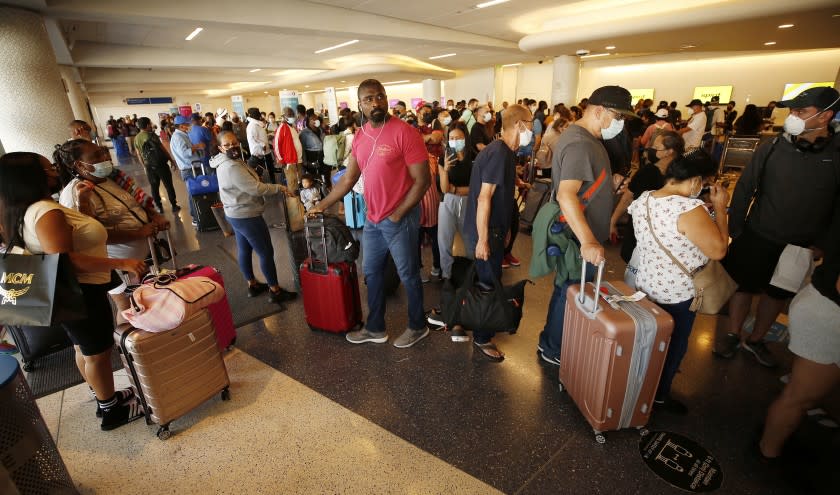How to protect yourself from COVID-19 on Labor Day weekend

Holidays have long been a source of public health heartburn in the COVID-19 era, but the upcoming Labor Day weekend presents a new conundrum: California may still be in the midst of a coronavirus surge, but the danger is not the same for everyone.
The robust vaccine rollout, as well as ubiquity of the highly contagious Delta variant, has created a wide spectrum of risk — with people's inoculation status, home lives and job settings, as well as the characteristics of particular activities, all helping shape how cautious they should be.
A fully vaccinated person mingling outdoors with a small group of others who are inoculated, for instance, is considered fairly low risk in terms of coronavirus transmission. But the calculus might be different if one of the participants has children at home still too young to be vaccinated, or is caring for an immunocompromised parent.
"Many of us do have some choices we can make about how we live our lives right now," Los Angeles County Public Health Director Barbara Ferrer told reporters Thursday. "There is great power to protect ourselves and each other in those choices, and approaching them thoughtfully is our path through this together."
Riskier settings include those that are crowded, are held indoors, include groups of unmasked or unvaccinated people or feature individuals shouting, singing or breathing hard.
The presence of unvaccinated people poses a much larger risk. Scientists suspect that unvaccinated infected people are contagious for a far longer duration than vaccinated infected people.
But even in generally safer situations, personal factors come into play.
Someone who's older, has a chronic medical condition, is unvaccinated or lives with someone who isn't inoculated might consider avoiding certain situations altogether, or at least taking additional precautions like wearing a mask or maintaining physical distance where possible.
Ferrer also noted that circumstances aren't always cut and dry. While a masked, distanced backyard book club might be considered relatively safe, how people behave also plays a role.
"If everyone in your backyard gathering stands up and unmasks to crowd around the snack table for half an hour, that will increase the risk of that activity," Ferrer said. "Again, we’re thinking of risk on a spectrum."
But Ferrer did add that unvaccinated people "should really avoid gatherings that are indoors, unless it's just with your household members, or it's with everybody else who's fully vaccinated."
Health officials at the state and federal level are also urging those who are unvaccinated not to travel over the long weekend, and to take precautions when ringing in the holiday.
"If gathering with family and friends, remember that spending time outside with others who are vaccinated will help to prevent transmission," Dr. Rochelle Walensky, director of the U.S. Centers for Disease Control and Prevention, said during a briefing this week. "Throughout the pandemic, we have seen that the vast majority of transmission takes place among unvaccinated people in closed, indoor settings."
The L.A. County Department of Public Health agreed "that unvaccinated people should take as many precautions as possible over the holiday and every day."
"Avoiding non-essential travel makes sense as does testing before traveling and quarantining and testing upon return," health officials wrote in response to an inquiry from The Times. "Unvaccinated people should avoid crowded outdoor and indoor settings, always keep their masks on when indoors in public places and worksites, and upgrade their face coverings to a respirator or KN95 if they have prolonged close contact with others who may be unvaccinated."
Unvaccinated plane travelers risk exposure to the coronavirus at multiple points on their journey.
"When you get to the airport, you're going to be exposed to a lot of people, and then you're going to get an airplane,” said Dr. Regina Chinsio-Kwong, a deputy health officer for Orange County. “Even if you're wearing your mask, you're going to be in an enclosed area for a prolonged period. Your immune system takes a hit because you're not sleeping well. I mean, there's just so many other factors that make things ripe for you to — if you would get exposed — to unfortunately become ill with COVID.”
State health officials also recommend residents delay both domestic and international travel until they're fully vaccinated. Those who are uninoculated should also get tested before and after their journeys.
All Californians, regardless of vaccination status, also must wear masks while aboard public transportation — including airplanes — or while in transit hubs.
While L.A. County and California as a whole are starting to see some promising signs that the latest COVID-19 wave may be starting to lose steam, health officials stress that the danger has not yet passed.
It will take more weeks before officials understand whether the reopening of schools and college campuses will result in a significant uptick in disease transmission. And gatherings held over Labor Day, especially those attended by unvaccinated and unmasked people, also pose additional risk.
L.A. County has reported an average of 2,596 new cases per day over the last week — down 25% from two weeks ago, when many schools began to reopen, according to data compiled by The Times. Orange County has reported 562 new cases a day, down 27% from two weeks ago.
Statewide, the daily number of new infections being reported, on average, is essentially unchanged from where it was a week ago.
But the battle is far from over, officials said.
"We are seeing less transmission across the board in general," Ferrer said. "But because the Delta variant is so capable of infecting lots of people, we still have very high numbers of people getting infected."
This story originally appeared in Los Angeles Times.

